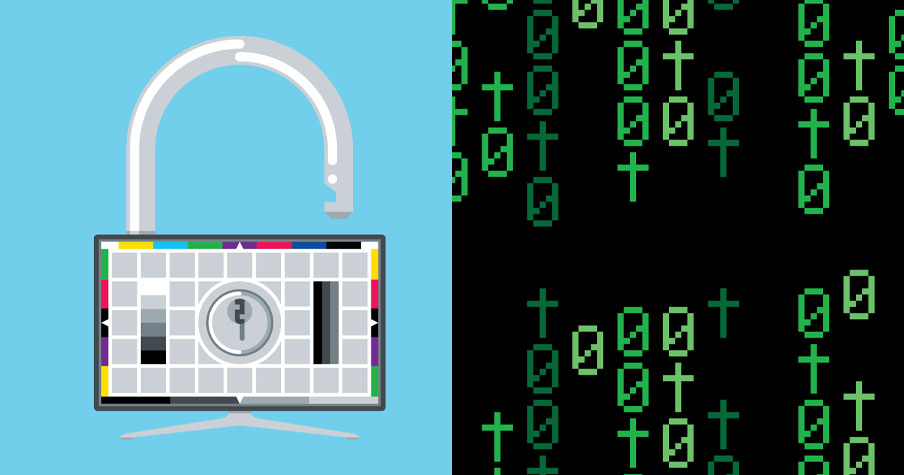
Illustrations by PÂté
Cryptocurrency has been a focus of intense media coverage, and if you’re an investor, you probably have an eye on the markets. If you’re in higher ed, however, you would do best to keep an eye on Ethiopia. It’s there that crypto is transforming credentials.
Over the past few years a quiet change in academic transcripts has been underway. From Indiana to Australia to the island of Cyprus, select schools have been migrating to a new type of record-keeping, using blockchain technology. Big news came in April when the Ethiopian government announced it will keep its digital educational records digitally and on blockchain. To accomplish the feat, the country is working with IOHK, the group responsible for the cryptocurrency known as Cardano.
In the past, Ethiopian schools have kept track of educational achievements on paper. Even when digitized, the system has been hampered by inaccuracies and missing data. Regional military conflict has made things worse, threatening safe storage of educational records. Students have a hard time impressing employers or studying abroad, as Ethiopian transcripts are seen as unreliable. With Cardano, all that could change. Ethiopian certifications are poised to be the leading edge.
On the Horizon: A Better Way for Theological Schools
Ethiopia may feel like a distant horizon, but seminaries should be paying attention. Here’s why: A major piece of what theological schools do is keep track of student data – a lot of student data. They capture learning progress in an orderly way, carefully storing records of programs and courses, grades, and other markers of student growth. But 21st century employers increasingly want schools to provide information beyond transcripts and grades. In nearly every field, organizations need to know more about how prospective students think, express their ideas, and build relationships. And unfortunately, seminaries are still operating record-keeping systems that don’t match the needs of today’s organizations.
Enter blockchain, which is revolutionizing record management. Cryptocurrency is the most famous application of blockchain, but the technology goes much deeper. Fundamentally, blockchain decentralizes the way we record, store, and share data. Instead of records being managed by a centralized organization, they are held by a decentralized autonomous organization (DAO), which strengthens security and increases capacity. Rather than all that precious data being stored on a single, vulnerable centralized server, blockchain provides a distributed method of record-keeping through independent “nodes.”
How exactly does blockchain work? There are any number of explanations online, but what matters is this: The technology is efficient and effective. Crypto credentials are able to take educational credits and record them securely on the public blockchain. The result? Credentials that are more robust, accessible, and reliable.
Blockchain is superior, for its code is tamper-proof and publicly verifiable. Nodes around the world can store the information permanently.
Blockchain Will Make Credentials Truly Robust
Crypto credentials naturally have all sorts of data “baked in.” They can contain rich information about a student’s educational pathways and performances in the form of digital badges, validated indicators of achievement, skill, quality or interest.
“To maximize their value,” says Lee Johnston, CEO of Strut Learning, which specializes in competency-based education technology, “digital badges must effectively communicate to employers the skills, knowledge, and abilities a learner acquired.”
Think about the traditional transcript. It’s essentially a list of the degree program, courses taken, credit hours achieved, grades earned, and perhaps a cumulative GPA. Yet think about what’s not there: specific skills, course outcomes, instructors, the key assignments and who assessed them. Perhaps some notes about a student’s strengths, personality, and performance. These data-rich credentials become more useful to learner and employer alike.
Imagine a seminary issuing a transcript which – along with the student’s grade in each course – includes the catalog description, the course outcomes, the professor of record, and a copy of the student’s final project, thesis, or dissertation. Or imagine a situation in which a seminary issues a series of badges certifying different preaching competencies, with each badge listing the actual evaluator and notes about the student’s performance. Better yet: Imagine an employer searching within a transcript to see if a student learned how to run an organizational budget.
To be fair, blockchain is not necessary to support these meaty digital certificates. Schools can come up with their own rich data system or use a centralized third-party provider like Degreed. Nevertheless, blockchain-based credentials are by default set up for robust data.
Blockchain Will Make Credentials Truly Accessible
Through the decentralized accounting of blockchain, a seminary can issue credentials but no longer needs to manage them. Instead, learners control their records, able to access and arrange their educational records with ease. Sharing a credential is as simple as copying a number or web link.
Seminaries have long played the role of intermediary with students’ credentials. They not only issue them; they also hold them. Learners typically do not think about this reality until they apply for a job. When an employer needs verification of training, the seminary is contacted. The school issues the transcript (for a fee), sharing the entirety of the educational venture (including that suspicious B- in Ethics).
Students love blockchain-based digital credentials because they retain control. If an alumna wants to share a transcript with her employers, she simply shares it. If an alumnus wishes to curate his credits to show only the relevant ones, he can. Blockchain makes students’ achievements “discoverable,” says David Andrews, president of National University. He adds that accessible records mean “forging stronger connections between the educational experience, the workforce, and lifelong learning.”
Seminaries seek to gain in this arrangement too. Record-keeping can be expensive and clunky. (If you ask very nicely, a registrar may allow you to see the “vault.”) Staff are burdened with answering time-sensitive transcript requests. In the event that a seminary fails, the credentials risk falling into oblivion. With blockchain, seminaries only need to act as credential issuers.

Blockchain Will Make Credentials Truly Reliable
Perhaps the best part of crypto credentials is that they become totally trustworthy. Merija Jirgensons and Jãnis Kapenieks argue that the credential of the future turns on validation, “encrypted similar to online banking with potential for records update according to need,” housed in “a permanent, secure and sustainable infrastructure for learning records.” Blockchain makes this possible.
Forgery is a major reason institutions of higher learning have kept a tight hold on credentials. And while handing digital credentials over to students or a third party feels like too much exposure, seminaries need to recognize that there are many ways to exploit the traditional system. Dozens of online companies are in the business of fabricating forged transcripts and phony diplomas. For the right price, they’ll even pick up the phone to confirm the lie.
Blockchain is superior, for its code is tamper-proof and publicly verifiable. Nodes around the world store the information permanently. The credential itself contains a link to the proof that it was issued by a certain party at a certain time. To authenticate the credential, an employer can copy-and-paste the credential’s unique ID into a blockchain verifier; one-click verification is also available. For further assurance, schools can provide a secure, dedicated portal, which is what Maryville University of St. Louis has done.
The New Standard for Records
Transcripts are evolving. Crypto technology is making them into something far more robust, accessible, and reliable.
Blockchain will feel new to most seminaries. The technology, however, is well established. Blockcerts, for example, has successfully enabled blockchain-based certifications since 2016. Now, with the rise of cryptocurrencies featuring an integrated “smart contract” layer, expect to see blockchain-based credentials more often – and in places a lot closer than Ethiopia.